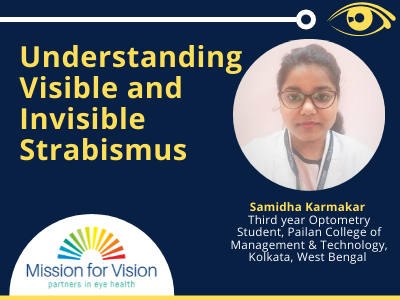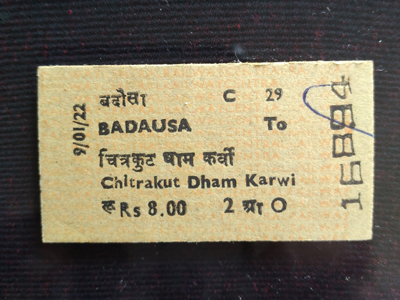A Day in the Life of a Field Investigator
Created By: Dhanaji Ranpise

There are 253 million people with visual disabilities worldwide. 36 million of these people are blind, 217 million are visually impaired. A massive 89% of people with visual disabilities are living in developing countries. The impact of blindness is particularly acute for vulnerable populations in developing nations and leads to major economic and social problems. Blind people are often no longer able to support themselves, and become fully dependent on family members and friends for their livelihood. Fortunately, in 75% of the cases, the visual disability can be corrected or cured with a low-cost solution, like cataract surgery or a good pair of glasses.
Mission for Vision (MFV) helps prevent and cure avoidable blindness and visual impairment in India. Eradicating preventable blindness provides impetus to productivity and leads to social and economic equality. The rural population in India has to face many challenges to access good quality eye care services. To change the scenario MFV has partnered with various reputed eye hospitals across India to provide quality eye care services to the rural population of India through its rural outreach program.
However, reaching out to remote locations and also analysing the gaps has been possible only with the able support of field teams. A field investigator plays a critical role in monitoring community outreach programmes and other activities on the ground. In order to ensure smooth operations, MFV has appointed Field Investigators at each partner hospital to closely monitor these activities.

Here is a glimpse into the daily activities of a Field Investigator:
- Conduct a study and assess the outcome of surgery by measuring the visual acuity of patients operated for cataract services
- Carry out an impact assessment study of vision-related ‘Quality of Life’ survey of patients who underwent cataract surgeries
- Review community outreach camps carried out by partner hospitals at their respective locations
- Assess the quality of hospital facilities available for the patients at the partner hospital periodically
- Conduct patient satisfaction surveys of patients availing services at partner hospitals.
- Study post-operative self-care practices of patients after undergoing cataract surgery.
- Collect data about various community eye health research activities being undertaken in a community setting
- Conduct project evaluations of projects implemented by Mission for Vision through its partners across India.
The Field Investigator is responsible for the independent assessment of eye care services at communities. They are responsible for interviewing the respondents in the community setting and hospitals. The appointment of Field Investigator at MFV is done based on his/her qualification and experience in the development sector.
Their day begins as early as 8.00 AM and involves visiting patients for interviews and data collection. In order to ensure smooth data-collection, they take prior appointments with the patients so that they can be available at home. Ideally, each field staff is working for 8 hours a day except on Sundays and other holidays. They have to make a round trip of up to 80 kilometers per day based on the patient’s location using two-wheelers or public transport.

Based on the distance of patients’ locations each field worker has to complete around 4 to 5 interviews per day. The response from the patients is quite warm and welcoming and they feel naturally connected with the team members. They feel happy that somebody has come to enquire about their health & well-being post their cataract surgery.
Typically, the Field Investigator conducts the vision assessment and this gives a clear picture on the success of the surgery and the status of the eyesight. Post the vision assessment, the investigators get the patients’ feedback and also assist them with any counselling that may be required.
The Field Investigators spend quality time with patients and often create a meaningful connection. A typical interview lasts for about 20-30 minutes. The responses are entered in a mobile application called PRISM, which stands for Patient Related Impact Studying Mechanism. Communicating with respondents of old age has its own interesting aspects and at times requires a lot of patience as well.
The Field Investigators wrap up their work and return home in the evening. Despite the long day at work, they usually chalk out the activities for the next day and prepare for another exciting day to meet with patients and understanding the ground situation better. Around the year, these professionals deliver their very best regardless of the weather conditions or the situation of the roads. The pandemic and the COVID-19 situation may have temporarily halted the operations, but their determination and commitment remain unaffected. The entire team at MFV and the Field Investigators have embraced newer styles of delivering eye-care services and adapting to guidelines that safeguard both the staff as well as our patients. We salute the indomitable spirit of these Field Investigators who continue to serve socio-economically challenged communities and eventually strengthen our goal to eradicate preventable blindness.
About the Author: Dhanaji Ranpise is a Senior Manager with the Programme Impact team at Mission for Vision. He manages the programme impact activities for the North and West zones i.e. Tulsi Eye Hospital – Nashik, Sankara Eye Foundations three units – Jaipur, Kanpur, Ludhiana, Nirmal Ashram Eye Institute – Rishikesh and Tejas Eye Hospital, Mandvi Surat, which are all partner hospitals of MFV.
SHARE NOW:
RELATED ARTICLES

Understanding Visible and Invisible Strabismus
In a move to create greater awareness on eye health and other related matters, this blog post focuses on the topic of Strabismus.
Read More.png)
A tête-à-tête with the eye health staff of MFV’s 100th Vision Centre
On the occasion of Mission for Vision's 100th Vision Centre launch, the Mission for Vision team decided to connect with the Vision Centre staff at Jasra to gain a better understanding of the ground realities in terms of eye care.
Read More
A Special Railway Ticket
Guest author Dr. Sil shares his memorable journey of visiting Sadguru Netra Chikitsalaya in Chitrakoot, Madhya Pradesh
Read More